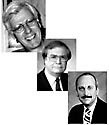 |
Navigation
|
|
Vol. 72, No. 6, June 1999 |
 Previous Page Previous Page
Regulating Electronic Commerce
Taxation
 The Internet Tax Freedom Act,10 passed by Congress last fall, has these
principal features, according to its sponsor: The Internet Tax Freedom Act,10 passed by Congress last fall, has these
principal features, according to its sponsor:
Three-year moratorium on special taxation of the Internet.
Bars state or local governments from taxing Internet access (that
is, the $19.95 or so that many Americans pay monthly to America
Online, CompuServe, Erol's, or other similar services to
access the Internet) from Oct. 1, 1998, until Oct. 21, 2001.
A limited grandfather clause permits the handful of states already
taking steps to tax Internet access - Connecticut, Wisconsin,
Iowa, North Dakota, South Dakota, New Mexico, South Carolina,
Tennessee, Texas, and Ohio - to continue to do so if they
can demonstrate that their taxes had already been "generally
imposed and actually enforced" on Internet access providers
prior to Oct. 1, 1998.
Three-year moratorium on multiple and discriminatory taxes
on electronic commerce. Bars state or local governments from
imposing taxes that would subject buyers and sellers of electronic
commerce to taxation in multiple states. Also protects against
the imposition of new tax liability for consumers and vendors
involved in commercial transactions over the Internet, including
the application of discriminatory tax collection requirements
imposed on out-of-state businesses through strained interpretations
of "nexus." It also protects from taxation, for the
duration of the moratorium, goods or services that are sold exclusively
over the Internet with no comparable offline equivalent.
Establish commission to study question of remote sales.
A temporary Advisory Commission on Electronic Commerce will study
electronic commerce tax issues and report back to Congress after
18 months on whether electronic commerce should be taxed, and
if so, how it can be taxed in a manner that ensures such commerce
won't be subject to special, multiple, or discriminatory
taxes. State and local elected officials will be given a prominent
voice on this commission. Congress, of course, retains full authority
to change or discard the commission's proposals.
No federal taxes. The sense of Congress is that there
should be no federal taxes on Internet access or electronic commerce.
Declares that the Internet should be a tariff-free zone. Calls
on the Clinton Administration to work aggressively through the
E.U. and World Trade Organization (WTO) to keep electronic commerce
free from tariffs and discriminatory taxes. Asks Commerce Department
to "report to Congress on barriers hindering the competitiveness
of U.S. businesses engaged in electronic commerce abroad."11
Significant questions concerning foreign taxes and tariffs
on electronic commerce also will have to be addressed in the
months and years ahead. The United States and European Union
issued a Joint Statement on global electronic commerce that includes
a commitment to "duty-free cyberspace."12
The Internet Tax Freedom Act and U.S./E.U. Joint Statement reflect
the administration's priority to encourage electronic commerce
by protecting it from additional government-imposed costs.
Jurisdiction
A growing number of cases have addressed the relationship
between sponsoring a Web site through which electronic commerce
is conducted and subjecting oneself to personal jurisdiction
in states from which the site may be accessed. One federal court
recently described the state of the law in these terms:
| The
goal of electronic commerce is to create a commercial environment
that electronically integrates and automates the 'steps' in a
commercial transaction, thus minimizing transaction costs. |
"At one end of the scale are circumstances where a defendant
'conducts business' over the Internet with residents
of the forum, allowing for the assertion of personal jurisdiction
in most cases. In such situations, the assertion of jurisdiction
is almost always proper. At the opposite end are situations where
a defendant simply posts information on a Web site which is accessible
to users in the forum state as well as others. 'A passive
Web site that does little more than make information available
to those who are interested in it is not grounds for the exercise
of personal jurisdiction.' In the middle are situations
where a defendant operates an interactive Web site, allowing
a user to exchange information with the host computer. In such
a case, a court must review the 'level of interactivity
and commercial nature of the exchange of information' to
determine whether jurisdiction should be exercised."13
Electronic Marketing
Legal issues involving electronic marketing often are novel
and complex. An excellent example is found in Niton
Corp. v. Radiation Monitoring Devices Inc.,14
in which the plaintiff alleged that the defendant designed its
Web site so that efforts to find the plaintiff's Web site
would result in the consumer being directed to defendant's
Web site instead. Web sites are identified by keywords that provide
a description for the site. Web browsers search out sites with
keywords that match the consumer's inquiry. Niton Corp.
alleged that the keywords used by Radiation Monitoring Devices
(RMD) to describe several of its Web pages included the phrase,
"The Home Page of Niton Corporation." On the basis
of this and other evidence, District Judge Robert Keeton issued
a preliminary injunction restraining RMD from such deceptive
marketing strategies.
|

Michael McChrystal, top, Marquette 1975, is
a professor of law at the Marquette University Law School.
William Gleisner, middle, Marquette 1974,
both a practicing attorney and computer consultant, maintains
a law firm-based litigation support service bureau in Milwaukee.
Michael Kuborn, bottom, Marquette 1998, is
with Olsen, Kloet, Gundersen & Conway, and is trained in
computer recovery and computer search and seizure techniques.
Products and services mentioned in this article should not be
construed as an endorsement.
|
Another set of legal issues concerns email marketing strategies.
Email marketing, often called "spam," can burden recipients
and the email servers they rely upon by clogging up the system.
Efforts to block spam have resulted in suits both by senders15 and recipients.16
Although legislative assaults on email marketing face considerable
First Amendment hurdles, statutes designed to regulate such marketing
have been enacted in a handful of states17
and bills are pending in Congress and in many state legislatures.18 In Wisconsin, Senate Bill 33 would significantly
restrict email marketing and, as this is being written, the bill
was passed unanimously by the Senate and is pending before the
Assembly.
Conclusion
Electronic commerce fits more or less uneasily into legal
rules designed for face-to-face, written (and signed) or voice
communications. The court of appeals decision in Walgreen illustrates
the problem. Email is neither a telephone/voice communication
nor a written (and signed) communication, although it shares
features with each. Yet the Walgreen court was forced by the
statute before it to decide the case on the basis of which of
these different forms of communication email resembled more.
The court made its decision, which may have been a good one in
that it fosters the development of electronic commerce. But the
best solution is probably a rule that considers the strengths
and weaknesses of transmitting prescriptions by email, rather
than the strengths and weaknesses of analogies of email to other
forms of communication.
The fact is, electronic commerce is here and the law is going
to have to catch up.
Endnotes
1 "Class
of '98: A boom in e-commerce in record year," San
Jose Mercury News.
2 The President's remarks
are published at the White House Web
site. See "A
Framework for Global Electronic Commerce," the government's
strategy statement.
3 No.
97-1513 (Wis. Ct. App. 2/19/98).
4 Wis.
Stat. § 450.11(1). "Dispensing. No person may dispense
any prescribed drug or device except upon the prescription order
of a [physician]. All prescription orders shall specify the date
of issue, the name and address of the patient, the name and address
of the [physician], the name and quantity of the drug prescribed,
directions for the use of the drug and, if the order is written
by the [physician], the signature of the [physician]. Any oral
prescription order shall be immediately reduced to writing by
the pharmacist and filed."
5 The definition is found at a
Web site maintained
by the Secretariat for Electronic Commerce, United States Department
of Commerce.
6 As reported on April 9, 1999,
by internet.com,
which calls itself "the e-business and internet technology
network". The concern of consumers about privacy is well
documented in surveys conducted by Louis Harris & Associates
and Alan F. Westin and reported in December 1998 at PrivacyExchange,
a Web site on consumer privacy, e-commerce, and data protection
that serves as an online global information resource and forum.
7 1997 Wis. Act 306.
8 See compilation
of state legislation.
9 Junger v. Christopher/Junger
v. Daley, 8 F. Supp. 2d 708 (N.D. Oh. 7/2/98) (upholding
15 C.F.R. 734.2(b)(9)(ii)(B) against challenges on First Amendment
grounds).
10 Public Law 105-277 (Oct. 21,
1998).
11 Comments of Rep. Christopher
Cox (R - Calif.) at his Web
site.
12 See text of Joint
Statement.
13 Millenium
Enterprises Inc. v. Millenium Music Inc., Civ. No. 98-1058-AA
(D. Ore. 1/4/99), quoting Zippo Manufacturing Co. v. Zippo
Dot Com Inc., 952 F. Supp. 1119, 1124 (W.D. Penn. 1997).
14 27
F. Supp. 2d 102 (D. Mass. 1998).
15 Hartford House Ltd. v. Microsoft
Corp., CV778550 (Santa Clara Supr. Ct. 1/28/99); (see
description
of litigation: "plaintiff alleged that Microsoft modified
its Internet Explorer email software to filter plaintiff's
competing electronic greeting cards, treating plaintiff's
product as spam and sending it to the junk mail folder").
16 See, e.g., America
Online Inc. v. LCGM Inc., 1998 U.S. Dist. LEXIS 20144 (E.D.
Va. 11/10/98); (see description
of litigation: "defendants sent unsolicited bulk emails,
used AOL computer systems in excess of their authority, harvested
email addresses of AOL customers, and deceptively used 'aol.com'
in its spam headers").
17 Including
California, Maryland, Nevada, and Washington.
18 John Marshall Law School Center
for Information Technology & Privacy Law maintains a Web
site that tracks such legislation.
|
